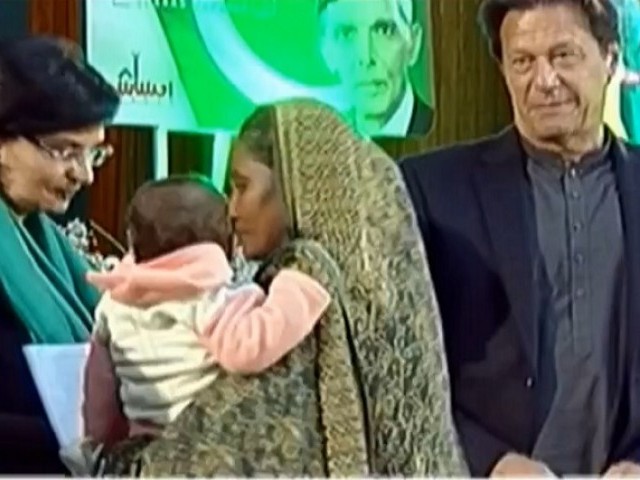
Foundation of welfare state laid: PM Imran
by Our CorrespondentISLAMABAD: Prime Minister Imran Khan on Friday launched the Ehsaas Kafaalat Programme under which seven million poverty-stricken women across the country would get a monthly stipend of Rs2,000 each through a foolproof and biometric-enabled cash disbursal mechanism.
“The foundation of a welfare state is being laid here. We have now started moving towards a welfare state. Soon, it will turn into the Pakistan of Quaid-e-Azam and Allama Iqbal,” Prime Minister Imran said while addressing the launching ceremony of the programme.
The ceremony marked the distribution of Kafaalat cards among the poorest women who sat beside the prime minister at the venue as per his own desire and what the event moderator Senator Faisal Javed said were the only VVIPs of the event.
Special Assistant to Prime Minister (SAPM) on Social Protection and Poverty Alleviation Dr Sania Nishtar, SAPM on Information and Broadcasting Dr Firdous Ashiq Awan, other cabinet members, parliamentarians, diplomats and people from cross sections of the society attended the event.
PM Imran said, “We will change it [state of affairs], that’s the meaning of Naya Pakistan, where we’ll take responsibility for the lower-class group.”
Imran said, “There’s a huge number of people who undergo challenges, who face difficulties in feeding their children. Setting up this system was necessary for the money to go to them.”
When people do not have money to get the required medical treatment, that, he said, was the “biggest crime of society”.
“Where a man is in pain, his children are in pain, his mother is in pain, when there’s sickness in a poor family, it becomes an even bigger challenge as they already face difficulties in feeding themselves. The entire family takes a hit,” he said.
Under the programme, each beneficiary woman would get a bank account and smart phone as part of the initiative to empower women through their formal interaction with the economy and digital inclusion.
“The smart phones would help educate the children of the poor women from their childhood. This will bring about a new revolution,” the prime minister remarked.https://twitter.com/pid_gov/status/1223222780549914624
He said seven million women would benefit from the scheme while another six million families had already been given health insurance cards which was the biggest achievement of the current government.
He said within fortnight, the government would launch another programme under the Ehsaas umbrella, to transfer assets to the poor women like cows, hens or others to help them earn their livelihood.
The prime minister congratulated Dr Sania Nishtar for successfully launching the scheme amid immense pressure from the government, which desired to utilise Rs200 billion allocated for its anti-poverty initiative without any delay.
Imran lauded Sania for developing a system based on data analytics to ensure that the government’s assistance reached only the deserving citizens, not the rich ones, as the government had recently detected and delisted over 800,000 ineligible people who had been receiving the cash assistance, despite having government job, cars and done foreign visits.
The prime minister said no anti-poverty initiative could meet success unless it was transparent. He said the beneficiaries of the Kafaalat programme would also be able to benefit from government’s upcoming ration scheme and other initiatives.
He said the initiatives, including the student scholarship, youth skill training and start-ups loan programme, were solely aimed at uplifting the poor people in true pursuance of the golden principles of the State of Madina.
In her presentation, Dr Sania drew a comparison between Kafaalat and Benazir Income Support Programme, saying the former featured a 10-year old database, multiple quarterly payment systems, paper-based surveys and sole source contracted banks.
Contrarily, the Kafaalat programme would provide monthly assistance through a fully biometric system on point of sales agents with secure gadgets, biometric ATMs and designated bank branches. The beneficiaries had been identified through a door-to-door digital survey plus data analytics, desk and web surveys.
Contrary to BISP, the Kafaalat beneficiaries would be able to avail all the Ehsaas graduation opportunities. However, all existing eligible beneficiaries of the BISP would continue to be part of Ehsaas Kafaalat Programme.
“For the first time, the poor people would be able to get government assistance on demand as they would not have to wait for 10 years to enlist themselves in the poverty survey, rather they could get themselves registered any time at the NADRA Desk Registration Centres to be established in each tehsil,” said the SAPM.
She said enrolment of one million families in 70 districts had been initiated and that they would start receiving stipend from February or March this year.
Other districts would be added by end of the year while more beneficiaries would be included through desk registration over the course of the year, she added.
Dr Sania said under the Ehsaas Governance and Integrity Policy, maximum measures were being taken to ensure transparency in the programme through true implementation of the whistleblower law, audit and data usage.
“Contrary to the previous governments, the prime minister has taken a bold decision of replacing his photo on Kafaalat Card with that of Quaid-e-Azam and resolved to eliminate corruption and political interventions from the social protection initiatives.”
‘A step towards welfare state’
Earlier in the day, Special Assistant to the Prime Minister on Information and Broadcasting Dr Firdous Ashiq Awan said the scheme is a step towards the realisation of the goal of welfare state.
In a tweet, she said this step was reflective of Prime Minister Imran’s vision of “one woman, one account”, which would prove a milestone in efforts aimed at women empowerment.
(With additional input from App)